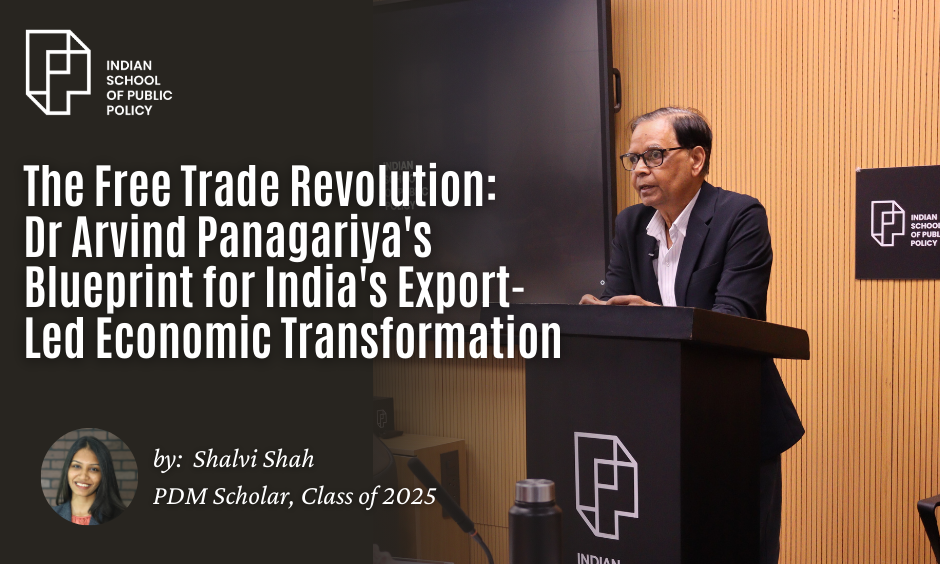
The Free Trade Revolution: Dr. Arvind Panagariya’s Blueprint for India’s Export-Led Economic Transformation

As India strives for accelerated economic development, Dr. Arvind Panagariya, the first Vice Chairman of NITI Aayog, presents a compelling vision of how free trade can be the driving force behind the nation’s export-led growth strategy. In order to realise India’s enormous economic potential, he advocates for a stronger embrace of free trade, challenging conventional economic wisdom. India can leverage its comparative advantages, promote a competitive business climate, and significantly reduce poverty through export-led growth by utilising the benefits of free trade. Dr. Panagariya contends that this strategy may hold the key to making India a major player in the world economy.
There are several countries like Korea, Taiwan, China, Singapore, Germany, Japan and Vietnam who have been able to successfully adopt an export-led growth strategy which can boost economic growth.
Role of Free Trade in Driving India’s Export-Led Growth
Free trade has a significant impact on several important areas that will shape India’s economic future. These include:
1. Exploitation of Comparative Advantage:
Dr. Panagariya underlined that India can leverage its comparative advantages by concentrating on industries in which it can produce goods and services more cheaply than other nations. By focusing on its strengths, India has the ability to take the lead in international markets, whether in technology, textiles, or agriculture. Free trade has the potential to propel industrial growth and innovation in India and make the country a global leader in production.
2. Harnessing Economies of Scale:
One of the significant benefits of free trade is its ability to help businesses achieve economies of scale. With access to larger markets, Indian firms can expand their operations, reduce per-unit costs, and increase profitability. Dr. Panagariya emphasised that this scaling up is necessary to increase the competitiveness of Indian firms on a global scale. The ensuing expansion helps the country’s economy as a whole, in addition to providing advantages to specific businesses.
3. Simulating Competitive Business Environment:
Through promoting efficiency and innovation, free trade promotes a competitive corporate climate. According to Dr. Panagariya, domestic businesses are driven to enhance their goods, services, and procedures in order to maintain their competitiveness when they are exposed to global competition. This pursuit of excellence has the potential to provide major advancements.
4. Reexamining Trade Deficit Debate:
Dr. Panagariya challenged the conventional view that trade deficits are inherently negative. He argued that trade deficits could be beneficial when imports are cheaper and exports command higher prices, indicating a favourable trade environment. This perspective shifts the focus from merely balancing trade to ensuring that the terms of trade are advantageous, thereby supporting economic growth and stability.
5. Reduced Poverty and Economic Development:
One of Dr. Panagariya’s most persuasive points was the contribution of export-led growth to the reduction of poverty. India can boost income levels, raise the standard of living for its people, and generate millions of employment by growing its export markets. The experience of other fast expanding economies, like China and South Korea, demonstrates how export-led growth may be a potent instrument for propelling long-term economic development and rescuing sizable portions of the populace from poverty.
Policy Insights for Integrating Free Trade
India needs to take care of a few important issues in order to accelerate export-led growth and fully realise the advantages of free trade:
1. Economic Policies in Support of Free Trade:
India must keep up its pursuit of free trade policies, which include lowering tariffs, getting rid of trade restrictions, and signing advantageous trade agreements. India can improve its prospects for economic growth, draw in foreign investment, and increase exports by fostering a more competitive and open market.
2. Building Export Infrastructure:
To help Indian businesses compete internationally, they must invest in infrastructure that supports exports, such as up-to-date ports, effective logistics networks, and dependable transportation systems. India can lower expenses, boost productivity, and raise the competitiveness of its products on global markets by enhancing its export infrastructure.
3. Promoting Innovation and Skill Development:
India has to prioritise innovation and skill development if it hopes to maintain its export-led economy. India can produce a workforce that can spur innovation and provide high-quality goods and services for the global market by making investments in education, R&D, and vocational training.
Dr Arvind Panagariya has a radical and innovative vision for the future of India’s economy: use free trade to spur an export-driven economic rebirth. India can unleash hitherto unheard-of economic potential by promoting trade-barrier-breaking legislation, investing in state-of-the-art export infrastructure, and fostering an innovative and competitive corporate environment. This plan not only promises growth but also creates the groundwork for a significant decrease in poverty, improving millions of people’s quality of life. By taking this course, India is not only joining the global economy but also setting itself up to take the lead and create a prosperous, innovative, and influential future for the entire world.
Register your Interest to Study at ISPP

Shalvi Shah
PDM Scholar, Class of 2025
In the bustling heart of Ahmedabad, where tradition meets innovation, emerges Shalvi Saurin Shah—a name synonymous with transformation. As an ISPP Scholar at the prestigious Indian School of Public Policy, Shalvi is on a mission to reshape the world. A gold medalist from Ahmedabad University, her academic brilliance is rivalled only by her passion for social impact. Through her groundbreaking project, MAHS (Menstrual Awareness, Hygiene, and Sanitation), Shalvi is dismantling taboos and uplifting communities. Globally recognised by the United Nations Academic Impact and the SUSI Program for Young Women Leaders, her accolades are a testament to her dedication. With ISPP as her platform, Shalvi is poised to drive policy changes that truly matter. Her journey is a relentless pursuit of excellence and an unwavering commitment to social change, making her an invaluable asset to any forward-thinking organisation.
LinkedIn: https://www.linkedin.com/in/shalvi-shah-1734721a0/


